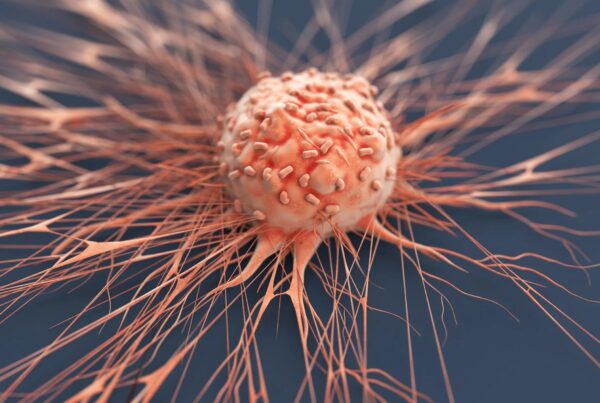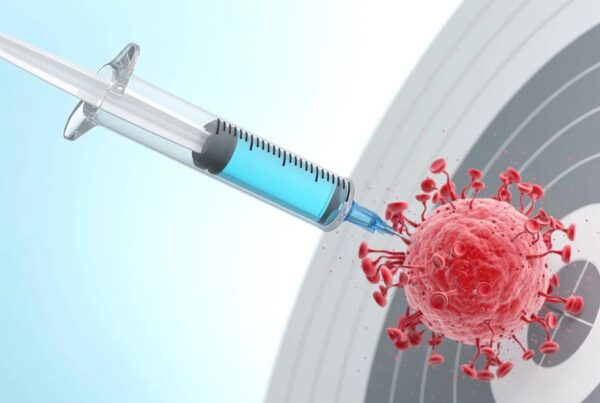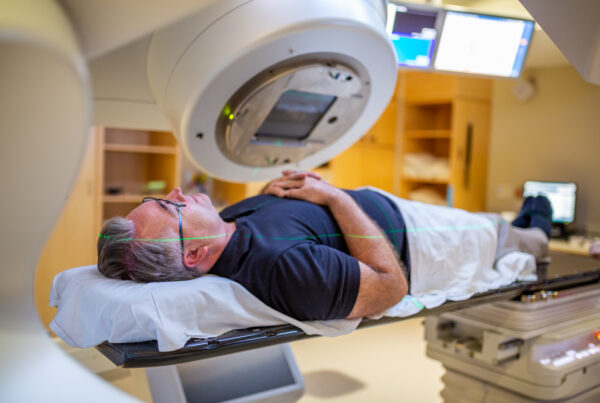No one can deny that cancer is a complex disease requiring multifaceted treatment approaches.
While chemotherapy generally targets rapidly dividing cells and radiation therapy uses energy to destroy cancer cells, hormonal therapy uses a unique approach that exploits the relationship between natural hormones and the growth of certain types of cancer.
Our deep understanding of how hormones affect cancer cells has allowed for the development of treatments that can either lower hormone levels or block their receptors on cancer cells.
This type of therapy isn’t suitable for all cancers, but it’s a cornerstone in treating specific cancers, especially those significantly affected by hormones like breast and prostate cancer.
This article aims to explore hormonal therapy in detail, from its basic mechanisms, types, and uses, to its advantages and disadvantages, while highlighting its vital role in modern medicine.
Liva Hospital relies on multidisciplinary teams: endocrinologists, obstetricians and gynecologists, and oncologists, who work together to tailor precise hormonal protocols for each case.

What Is Hormonal Therapy?
To understand hormonal therapy, we must first grasp how hormones, which are natural chemical substances produced by the body to regulate various functions, can play a role in the growth of some types of cancer.
In certain cancers, cancer cells have receptors on their surface or inside them that respond to hormones, just as normal cells do.
When these hormones (such as estrogen and progesterone in women, or androgens like testosterone in men) bind to these receptors on cancer cells, they send signals that stimulate the growth and proliferation of these cells.
These cancers are known as “hormone-sensitive” or “hormone-dependent” cancers.
The goal of hormonal therapy is to disrupt these hormonal signals that fuel cancer growth.
This can be achieved in two main ways: either by reducing hormone levels in the body so that they are not available in sufficient quantities to stimulate cancer cells, or by blocking hormone receptors on cancer cells.
This targeted approach allows for the control of tumor growth in a different way than traditional treatments, with side effects that are often different and sometimes less severe than broad chemotherapy.
How Hormonal Therapy Works?
Hormonal therapy works through multiple mechanisms, all aimed at cutting off the supply of hormonal signals that cancer cells need to grow.
These mechanisms vary depending on the targeted hormone and the nature of the cancer. In the context of hormone-sensitive breast cancer (i.e., that which has estrogen/progesterone receptors or both), the main mechanisms include:
- Selective Estrogen Receptor Modulators (SERMs): These drugs bind to estrogen receptors in cancer cells, thereby preventing estrogen from binding to them and sending growth signals.
At the same time, these drugs may act as estrogen in other tissues (like bones), which may provide some benefits. The most famous example is Tamoxifen, widely used in pre- and post-menopausal women. - Aromatase Inhibitors (AIs): Aromatase is an enzyme necessary for converting androgens into estrogen in peripheral tissues (like fat tissue), which is the main source of estrogen in postmenopausal women.
These drugs block this enzyme, significantly reducing estrogen levels in the body. Examples include Anastrozole, Letrozole, and Exemestane. These drugs are primarily used in postmenopausal women. - Selective Estrogen Receptor Degraders (SERDs): These drugs bind to estrogen receptors and stimulate their degradation, thereby reducing the number of available receptors on cancer cells. An example is Fulvestrant.
Types of Cancers That Benefit from Hormonal Therapy
Not all types of cancer benefit from hormonal therapy; it’s primarily effective in cancers that are “hormone-sensitive,” meaning their growth is directly affected by hormones.
The most prominent types of cancers that benefit significantly from hormonal therapy are:
- Breast Cancer: Hormonal therapy is a cornerstone in treating breast cancer where estrogen receptors (ER) and progesterone receptors (PR) are positive (ER+/PR+). Approximately 70-80% of breast cancers are of this type. Hormonal therapy is used at different stages:
- After surgery (adjuvant therapy): To reduce the risk of cancer recurrence. Treatment can continue for years (usually 5-10 years).
- Before surgery (neoadjuvant therapy): To shrink the tumor size to facilitate surgery.
- In cases of advanced or metastatic cancer: To control tumor growth and alleviate symptoms.
- Prostate Cancer: Most prostate cancers rely on testosterone for growth. Therefore, hormonal therapy, also known as “Androgen Deprivation Therapy (ADT),” is a primary treatment:
- In early stages with high risk: Along with radiation.
- In cases of advanced or metastatic cancer: To control the disease and reduce symptoms.
- After surgery or radiation: If the cancer returns or there’s a high risk of it returning.
- Endometrial Cancer: Some types of endometrial cancer, especially those in early stages or low-grade, may be hormone-sensitive and can be treated with progestin or aromatase inhibitors.
- Ovarian Cancer (sometimes): A small number of ovarian cancer types are hormone-sensitive and may benefit from hormonal therapy.
- Thyroid Cancer (sometimes): After thyroidectomy for cancer treatment, patients are often given replacement thyroid hormones at slightly higher doses to suppress the growth of any remaining cancer cells sensitive to TSH.
Benefits of Hormonal Therapy
Hormonal therapy offers several important benefits that make it a valuable treatment option for hormone-sensitive cancers:
- High Selectivity: Unlike chemotherapy, which affects all rapidly dividing cells, hormonal therapy targets cancer cells that have hormone receptors, minimizing the impact on other healthy cells in the body.
This often leads to “less severe and more manageable side effects” compared to broad chemotherapy, although hormone-specific side effects can be bothersome for patients. - Effectiveness in Disease Control: Hormonal therapy has proven highly effective in slowing or stopping the growth of hormone-sensitive cancers.
In many cases, it can lead to “long-term responses,” significantly contributing to prolonging patients’ lives and improving their quality of life.
In breast cancer, hormonal therapy has shown its ability to significantly reduce the risk of cancer recurrence. - Use at Different Stages: Hormonal therapy can be used at various stages of the disease, whether as adjuvant therapy after surgery to reduce the risk of relapse, or as neoadjuvant therapy before surgery to shrink the tumor, or as palliative treatment.
- Good Long-Term Tolerability: Due to its milder side effects compared to systemic treatments, hormonal therapy is often more tolerable for patients in the long term, allowing them to complete long-term treatment courses necessary to achieve maximum benefit.
Side Effects of Hormonal Therapy
While hormonal therapy is generally considered more tolerable than chemotherapy, it does cause side effects resulting from changes in hormone levels in the body.
These effects vary depending on the targeted hormone and the patient’s gender:
In Women (Side effects related to estrogen reduction)
- Menopausal symptoms: Hot flashes, night sweats, vaginal dryness, mood swings, sleep problems.
- Osteoporosis: Can increase the risk of fractures. Bone density monitoring, calcium and vitamin D intake, and exercise are recommended.
- Increased risk of blood clots (with Tamoxifen): Tamoxifen can increase the risk of blood clots in the legs, lungs, or brain, though this is rare.
- Joint and muscle pain: Common, especially with aromatase inhibitors.
- Weight gain: May occur in some cases.
- Changes in fertility and sexual function: May affect the ability to conceive and sexual desire.
In Men (Side effects related to testosterone reduction)
- Menopause-like symptoms: Hot flashes, decreased libido (erectile dysfunction), fatigue.
- Osteoporosis: Increases the risk of fractures.
- Loss of muscle mass and increased fat: May lead to changes in body composition.
- Gynecomastia: Breast tissue growth.
- Mood swings and depression.
- Increased risk of cardiovascular disease (long-term): There is some evidence that androgen deprivation therapy may increase this risk.

Final Word
Hormonal therapy, with its precise mechanisms and ability to target the chemical growth pathways of cancer, has proven to be an indispensable tool in the arsenal against this disease.
It embodies how a deep understanding of cellular biology can lead to effective treatments that balance disease eradication with preserving the patient’s quality of life.
Hormonal therapy is not just a treatment; it is a testament to the power of science in harnessing the body’s natural mechanisms to change the course of intractable diseases.
However, safety lies in precise customization, continuous medical evaluation, and an annual review of risks and benefits.
When these conditions are met, hormonal therapy can be a smart and advanced treatment option, just as it is applied at Liva Hospital with the best quality standards.
Frequently Asked Questions
What types of cancers does hormonal therapy treat?
Hormonal therapy is primarily used to treat cancers that rely on hormones for growth, such as most types of breast cancer and prostate cancer. It can also be used in some types of endometrial, ovarian, and thyroid cancers in specific cases.
Does hormonal therapy cause hair loss or severe nausea like chemotherapy?
Typically, hormonal therapy does not cause complete hair loss or severe nausea and vomiting like chemotherapy. Its side effects vary and are related to hormonal changes in the body, such as hot flashes, vaginal dryness or erectile dysfunction, joint pain, and osteoporosis.
How long does hormonal therapy last?
The duration of hormonal therapy varies significantly. For breast cancer, treatment may last for 5 to 10 years or more. For prostate cancer, treatment may be continuous long-term or for specific periods depending on the stage of the disease.
Can I get pregnant during hormonal therapy for breast cancer?
Pregnancy is not recommended during hormonal therapy for breast cancer, as the drugs can be harmful to the fetus. Additionally, hormonal therapies can affect fertility. Fertility preservation options should be discussed with your doctor before starting treatment.
What happens if cancer becomes resistant to hormonal therapy?
If cancer becomes resistant to hormonal therapy, your doctor will re-evaluate the case. This may involve changing the type of hormonal drug to another, or adding targeted therapies (such as CDK4/6 inhibitors), chemotherapy, or immunotherapy, depending on the nature of the resistance and the type of cancer.
Is hormonal therapy safe in the long term?
Hormonal therapy is generally safe in the long term for most patients, but it requires continuous monitoring for potential side effects, especially those related to bones (osteoporosis) and cardiovascular health. Your doctor will assess the benefits versus risks for each patient individually.



